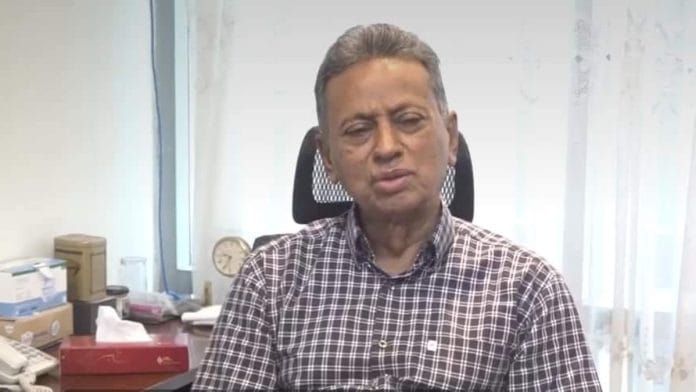New Delhi: Eleven days after an interim government led by Mohammad Yunus as chief advisor was sworn in on 8 August, the country’s principal opposition party during Sheikh Hasina’s reign, the Bangladesh Nationalist Party (BNP), has extended a hand of friendship towards India.
In an exclusive interview to ThePrint over phone from Dhaka, member of BNP’s international affairs committee and the country’s former commerce minister (2001-04) Amir Khasru Mahmud Chowdhury said India and Bangladesh should remain best of neighbours.
“My party, BNP, wants friendly ties with India. Irrespective of who comes to power and who loses it, India and Bangladesh cannot afford to not be friends. Mutual respect, bilateral peace and promotion of economy on both sides have to be our joint objectives. You can’t change your neighbour, can you?” Chowdhury, 74, said.
He, though, said India needs to change the lens through which it views Bangladesh. “India needs to get over its Hasina hangover and stop the prevailing narrative in a section of mainstream and social media that is questioning the student-led quota protest movement that toppled a dictator,” he said.
Also Read: India enjoys healthy trade surplus with Bangladesh. The political crisis can hurt trade, FTA chances
‘Don’t discredit Bangladesh’s youth’
Sheikh Hasina’s hasty resignation as prime minister and dramatic exit to India in a military helicopter on 5 August after a students’ quota reforms movement turned into a clarion call for her ouster, plunged Bangladesh into chaos. Protestors stormed Gana Bhaban, her official residence, and plundered it, her father ‘Bangabandhu’ Sheikh Mujibur Rahman’s statues were defaced and pulled down and Awami League leaders, workers and supporters were targeted in a spate of violence.
Many Bangladesh watchers and commentators, including former Indian Ambassador to Bangladesh and former foreign secretary Harsh Vardhan Shringla, hinted at the “involvement of foreign powers who are inimical to Bangladesh’s interests” in Hasina’s ouster.
Chowdhury told ThePrint such observations from India discredit a “spontaneous students’ movement”.
“Do Bangladeshis have no agency? Citizens from every section of society joined the movement against Hasina. Why are some sections of Indian media and social media space trying to discredit a popular uprising against a dictator who has been in power through suppressing opposition voices through jail, forced disappearances, custodial torture and rigged elections?
“For India-Bangladesh relations to prosper in the days ahead bogeyman narratives of hopelessness without Hasina have to stop,” he said.
Chowdhury said India didn’t question the 7 January national polls in Bangladesh that brought Hasina back to power for a historic fourth term.
“Many foreign publications questioned the elections and called it a sham. India stood with Hasina. Democracy, fundamental rights of citizens, rule of law should be the governing principles for any government. India never questioned Hasina when she suspended all of these to hang on to power. Much of the civil society in Bangladesh got angry with India for standing by Hasina and soon after the January 7 results, the ‘Boycott India’ campaign began,” he said.
Mirroring the ‘India Out’ campaign in Maldives, Bangladeshi social media influencers and activists had launched a ‘Boycott India’ campaign against the sale of Indian products in Bangladeshi markets. “Activists say that India’s backing of the Awami League is to protect its own economic and security interests. In the process, New Delhi has undermined Bangladesh’s democratic aspirations,” Faiz Ahmad Taiyeb wrote in a report for The Diplomat on 15 March this year.
Elaborating on this sentiment, Chowdhury said, “Pro-Hasina narrative builders in India should wake up and smell the coffee. Bangladesh has gone back to the people. The common Bangladeshi wants to build a new country without fear and free from the shackles of the past. India should engage with the new Bangladesh.”
‘Some innocent Hindus also suffered’
Chowdhury said Hasina had created the impression that Hindus were safe in Bangladesh as long as she was in power.
“Many in India bought that lie. Targeted attacks on Hindus took place during her time in office. She portrayed an image of being secular. But in 2006, she had signed an MoU with the far-right Khelafat Majlish to form a political alliance. She had been close to the Islamist Hefazat-e-Islam. A close examination would have told you how she created this secular bubble about her government, but pandered to all Islamists. She was no friend of Hindus,” he said.
Chowdhury said his party, the BNP, does not believe in minority-ism.
“Every citizen is equal in Bangladesh. Everyone has equal rights. Why create division by using such terms. In Bangladesh, we not just tolerate but respect all citizens,” he said.
After the fall of the Hasina government on 5 August, there were reports of attacks on Hindus and other religious minorities across Bangladesh.
“Hindus in Bangladesh, perceived by many to be supporters of the prime minister who was ousted in a popular uprising, braced for violent reprisals on Wednesday as the rudderless country awaited the formation of a new government after a month of unrest,” Saif Hasnat and Qasim Nauman wrote in a report for The New York Times dated 7 August.
Chowdhury said common people were angry with Awami League leaders and workers after years of ‘repression’ under Hasina’s reign.
“There were attacks on some Awami League leaders and supporters. I do not approve of it. Hindus were among those attacked. Some innocent Hindus also suffered. But aren’t there instances of attacks on minorities in India? Do you judge an entire country on the basis of a few attacks on its minorities? Do you say minorities are not safe in a country because of a few incidents? People who are saying this do not understand Bangladesh.”
Also Read: Exile of atheist poet Daud Haider shows Bangladesh wasn’t secular paradise even 50 years ago






